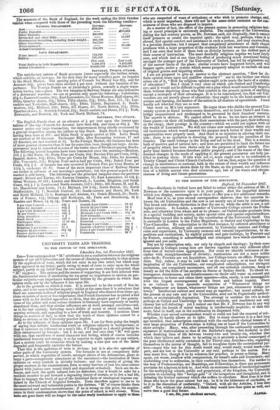TO THE EDITOR OF THE ECPECTATOR.
Oxford, 2d November 1847.
Slit—Residents in Oxford have not failed to notice either the address of Mr. F. Newman or the comments upon it in your paper. And the impartial interest which you display, encourages one of them to offer you a few additional remarks. Most true it is, as your second correspondent observes, that the question be- tween the old Universities and the new is not merely one of tests by subscription. The broad and obvious distinction is that the one is, while the other is not, a col- legiate system. In London, a member of University College attends the Profes- sors, and otherwise lives where and as be pleases: an Oxford under-graduate lives in a special building and society, under special rules and special superintendence. Something beyond this is added by the constitution of the 'University itself. One is amenable in London to the Police Magistrate, in Oxford and Cambridge to the Vice-Chancellor. By subscription in the first instance, by enforced attendance at Church services, ordinary and sacramental, by University statutes and College rules and supervision, by University sermons and tutorial expostulations, by im- positions and nudications, by nightly patrols and gate-lockings, by Proctors and by Porters, something is acknowledged and attempted lime which elsewhere is ignored and pat aside.
But not by subscription only nor only by chapels and theology; by their mere association in Colleges young men are thrown together with very different effect from that of lecture-room aggregation. Nor must we identify strictness of dis- cipline with straightlacedness of divinity; rustications are not a mere milder auto-da-fe; Proctors are not Inquisitors, nor College-tutors ex-officio Propagan- dists. Nay, rather, it may be said that on the real system, or at least the real inspiration of the old Universities, our complicated subscriptions, our stringent exclusions, our compulsory sacraments, and all our orthodox etceteras,- hung ES loosely as did the folds of the surplice on Sterne or Sydney Smith. To check ex- travagance, drunkenness, and licentiousness—to throw cold water on conceit and impertinence, to foster and educe their opposites—this, surely, is not incompatible with the largest encouragement of the freest and boldest inquiry. There is no violence in that apostolic conjunction of "Whatsoever things are true, whatsoever are honest, whatsoever things are just, whatsoever things are lovely." Intellectual culture and moral may go together; but moral culture, for the present at any rate and in the Universities, need not be Papistieally authori- tative, or ecclesiastically dogmatical. The attempt to combine the two is made perhaps at Oxford and Cambridge by obsolete methods, and machinery not only clumsy but self-defeating: yet I cannot see that Mr. F. Newman has in any way shown that the breath of moral teaching is intellectually mephitic; or that this azote, fatal in itself, can in the combination be dispensed with. Whether your second correspondent would or could not hail the removal of sub- scription, he hardly allows us to infer. But to many observers it is a fact long ago recorded, that subscription combined with the exclusively clerical tenure of a very large proportion of Fellowships is killing one at least of the Universities by sheer atrophy. Many, who, after proceeding through the confessedly unmeaning signature of matriculation to that of the Bachelor's degree, feel doubtful ilk that most doubting time of life between twenty-two and twenty-six, whether that which they believe and desire to be acting on is precisely a moral counterpart of the pure intellectual entity contained in the Thirty-nine Articles—who, regarding themselves in the mirror of thought, fail to recognize there the ecclesiastical pat- tern—many who but for this doubt would stay, would study, would teach—de- part, and are lost to the University at any rate, perhaps to the nation. For a man must live, though it be by common-law practice, or penny-a-lining. Many again, yet worse, swallow with compunction, for bread's sake and literature's; and conforming ever to ordination, in their conformity lose themselves. For neither in the way of Professorships, nor Headships, nor Fellowships, is there any permanent provision for a layman to look to. And with an enormous drain of intellectual capital for the multiplying schools, public and proprietary, of the kingdom, the University persists in excluding this "foreign gold " of the scrupulous and thoughtful, and in debasing the limited currency which she suffers to circulate. Most true it is that those who know the place cannot but say, be it in the bitterness of exclusion, or be it in the discontent of conformity, "Oxford with all thy Articles, I love thee still." Yet, without thy Artickef I think they would love thee quite as well, and serve thee a good deal better.


























 Previous page
Previous page